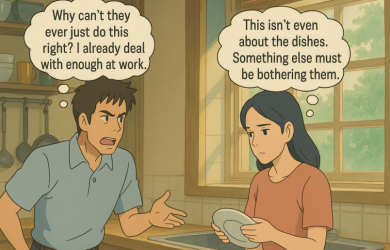6 Ways to Recover from Overreactions to Emotional Triggers

Unlock Daily 30-Sec Tips for a Happier Relationship
👉 Subscribe FREEKey Takeaways
Marriage.com AI Quick Summary
Couples in intimate relationships are impacted by memories of their parents’ examples of what it means to be a spouse. For instance, Jessica, 36, was raised in a divorced family. Her parents split when she was six years old and she learned early on that when people have difficulty resolving conflicts, it can lead to the demise of a relationship.
Giving up on love after her second divorce
Jessica saw both of her mother’s marriages fail and observed her giving up on love after her second divorce. Her father, who left the family to move in with a co-worker, has had many unsuccessful relationships. Her husband Tony, 40, was raised by parents who enjoyed a long-term happy marriage so he’s often blindsided by her overreactions to his comments, behavior, or events in their busy lives.
Jessica and Tony have been married for ten years and have three young children. During times of high stress in their marriage, such as after Tony was laid off from his job recently, Jessica overreacts and will yell, issue ultimatums, and focus on her individual needs rather than their goal of having a loving and compassionate partnership. They both acknowledge that Jessica is affected by ghosts from her past.
Tony reflects: “Suddenly we’ll be talking and Jessica’s gestures and tone of voice changes. It’s almost as if she isn’t talking to me. She might yell, or stomp around the room. That’s when her accusations start and she might threaten to leave or to throw me out. I’m usually feeling pretty perplexed and often just freeze, I don’t know what to say or do.”
Jessica responds: “It took me a few years to trust Tony and to realize that he wasn’t going anywhere. As long as I am honest with him, he’ll reciprocate and be real with me. If I start making things up or blaming him – and not owning my issues, I’ll have an intense reaction to something he says or does out of the blue. When this happens, I ask Tony to remind me that this is past stuff and has nothing to do with us in the here and now.”
In Hold Me Tight, Dr. Sue Johnson explains that you can tell when one of your “raw spots” has been hit because there is a sudden shift in the emotional tone of the conversation. She explains, “You and your love were joking just a moment ago, but now one of you is upset or enraged, or, conversely, aloof or chilly. You are thrown off balance. It is as if the game changed and no one told you. The hurt partner is sending out new signals and the other tries to make sense of the change.”
Coping effectively with emotional triggers
Becoming more conscious of extreme reactions and not denying them or becoming defensive, is the first step to coping effectively with emotional triggers. Bringing to consciousness those triggers that provoke intense responses from you will lessen your risk of sabotaging your marriage by withdrawing, issuing ultimatums, or threatening to leave.
The next step is recovering from blunders when you overreact and can feel yourself digging your heels in.
The following suggestions will help you when you have a tendency to become entrenched in a negative pattern of overreacting to emotional triggers that prevent you from apologizing or granting forgiveness to your partner.
1. Pay attention to overreactions
Pay attention to overreactions and thoughts that seem intense or repeat themselves.
You don’t have to do anything else but be aware of mistrustful and/or self-defeating thoughts without reacting to them.
Let them play out in your mind. What script is your mind creating about the other person or situation? For instance, “Tony will leave me as my ex did.” I recommend listing these thoughts in your journal or notebook (print or digital) to enhance your self-awareness.
2. What happened prior to you feeling triggered?
Sometimes there are certain situations that set you up to being triggered. For example, having a stressful day, being sleep deprived, your partner reminding you of your ex-spouse, or seeing someone from your past.
When you’re trying to identify your emotional triggers, often you can prevent yourself from being triggered in the future by slowing down once you’re aware of past experiences with them.
3. Reflect on your needs that weren’t fulfilled in your childhood
Expect to make mistakes when your unmet emotional needs influence your reactions.
Being triggered emotionally can usually be traced to one or more of your deepest needs or desires that have not been met in the past.
Take some time to think about which ones were neglected. These needs might include acceptance, love, safety, respect, control, or being needed by others. By being aware of your unmet emotional needs, you’ll be better able to cope, but expect that you will make mistakes and overreact to your partner’s comments or behavior on occasion.
You’re wise to adopt realistic expectations and to have a recovery plan. For example, your plan might be to ask your partner for a 15-minute break and to do some quiet reflection or yoga.
4. Focus on breathing and slow it down
One thing is certain, your breath is always there with you – it’s part of you and accessible, and therefore a reliable way to relax.
Keep focusing on your in-breath and out-breath for a few minutes. Breathe in through your nose and exhale through your mouth as you count to ten.
Thinking about a pleasant place can help you relax. Try imaging yourself in your favorite place. If your attention goes back to the triggering person or situation, pull your attention back to your breathing.
5. Find the humor in the situation and lighten things up
If you’re speaking with someone, excuse yourself and say that you need to go to the bathroom. Return when you’re feeling more centered and calmer. Find the humor in the situation and go easy on yourself and your partner.
Practicing this suggestion is not always possible, but you might be surprised how much laughter and pleasure lightens your mood and mindset.
Next, if you’re feeling furious at your partner, instead of exploding at them, consciously set those feelings aside to experience and release later in a healthy way. You might scream into a pillow or do an intense workout. Be very careful not to deny your emotions because you might find that you have a delayed reaction that’s exaggerated.
6. Apologize to your partner for your unreasonable behavior
Plan to apologize to your partner for exactly what you did or said when you were triggered.
Lastly, apologize for your actions if you’re aware that you overacted due to triggers from your past. Start with taking responsibility, offering a sincere apology, keeping it brief, and not focusing on what your partner’s behavior was that triggered you.
For instance, Jessica’s apology to Tony was heartfelt and didn’t focus on his behavior, so he was able to accept it and move on.
After Jessica yelled at Tony and called him a jerk when she was mad at him, she calmed down and said, “I’m sorry that I yelled at you and called you a name.
I know you are doing your best to find a new job and I love you and want to get back on track. Notice that Jessica owned her behavior, didn’t make excuses or focus on the reasons for her inappropriate outburst.
Perhaps it’s because intimate relationships bring the possibility of love and closeness that we’re confronted with wounds from our past. Some people even create a narrative for their life that focuses on suffering, shame, and blame.
However, with self-awareness and learning effective ways to cope with intense reactions to triggers, we can begin to trust ourselves and our partner enough to attain the safety and security needed to heal raw spots from the past. By doing this we can form a loving partnership and embrace the concept of “We’re in this together” and form a collaborative marriage that endures the test of time.
 Tips
Tips
Write your tip or submit a video tip
All tips are reviewed before the publishing.
Share this article on
Want to have a happier, healthier marriage?
If you feel disconnected or frustrated about the state of your marriage but want to avoid separation and/or divorce, the marriage.com course meant for married couples is an excellent resource to help you overcome the most challenging aspects of being married.
Related Articles
Recent Articles
Related Quizzes
Unlock Daily 30-Sec Tips for a Happier, Healthier Relationship
👉 Subscribe FREE on YouTube We'd love your feedback!
We'd love your feedback!
 Expert Q&A
Expert Q&A
Ask your question related to this topic & get the support you deserve from experts.



















 Thanks for your feedback!
Thanks for your feedback!